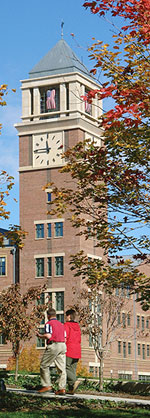KANSAS SPOTLIGHT
Climate Change
 |
| The Sprint Campus in Overland Park has space for 14,500 workers, covers 200 acres (81 hectares) and includes 4 million sq. ft. (371,600 sq. m.) of office space and 4 million sq. ft. (371,600 sq. m.) of parking space. The 18 office buildings and 14 garages were part of a $700- million expansion project six years ago. |
| T |
en months ago, the Kansas Chamber of Commerce delivered a stern rebuke to state government.
"Kansas strengths cannot overcome business concern with tax climate," the chamber said as it appealed to the governor and state lawmakers to reduce the tax burden on companies doing business in Kansas.
By July 1, those elected officials had delivered the results business leaders were seeking, repealing all property taxes on newly purchased business machinery and equipment. The tax change is expected to save Kansas businesses US$300 million over the next five years.
Kansas Gov. Kathleen Sebelius proposed the law last December at an event named the "Prosperity Summit" in Wichita. After signing the initiative into law in May, Sebelius didn't have to wait long to see evidence of its desired effect.
In July, Swift- Cor Aerospace Inc. opened a manufacturing plant in Wichita and credited the repeal of property taxes on manufacturing machinery as a major impetus. The Gardena, Calif.- based firm plans to hire up to 30 new workers this year and 200 within five years.
"Having analyzed a variety of possible expansion locations, we finally decided that Wichita was the best place to set down some new roots," Sam Longo, Swift- Cor president, said. "It is already home to several of our existing customers, as well as many others we expect to add in the near future."
Kansas lawmakers passed other bills to help businesses compete. The Legislature approved a plan that phases out the estate tax by 2010, removed the custom computer software sales tax, eliminated the sales tax on aircraft repairs and modifications for labor and parts, and reduced the franchise fee rate.
By the end of the 2006 legislative session, the Kansas Chamber was singing the praises of state officials. And Gov. Sebelius was newly optimistic about Kansas' chances to recruit and grow more companies.
"Kansas employers will now be able to invest in the new technology they need to compete with their counterparts all over the world, which will help them grow their businesses and create jobs," she said.
Improving the state's business climate has been a priority for Sebelius since she took office four years ago. In September, Forbes ranked Kansas the 21st best state for business, noting that Kansas had the 10th best regulatory environment, 15th best quality of life and 20th best prospects for growth. In terms of business costs, Forbes placed Kansas at No. 28. The greater Kansas City metro area was named the No. 1 place to start and grow a business in the Midwest by Entrepreneur magazine. For logistics space users, the metro area offers the largest rail center based on tonnage, the largest air cargo facility in a six- state region, the third largest trucking center in America and more foreign trade zone space than any other metro in the country.
Kansas- based executives say that the state is moving in the right direction. Wayne Young, real estate manager for Sprint Nextel in Overland Park, says that Kansas has "a very good business climate. We have seen that, especially in the Kansas City area. The city is very willing to work with businesses here, not providing the red tape that you would run into in other areas."
Six years ago, Sprint made a huge commitment to Overland Park by developing a $700- million, 22- building, world headquarters campus for 14,500 employees. Young tells Site Selection that "real estate costs were a huge factor in this case. That is true of most locations around the Kansas City area. The costs of doing business here are cheaper than in Dallas- Fort Worth, and real estate costs are much cheaper here than on either one of the coasts."
Sprint now employs about 15,000 workers in the corporate headquarters and surrounding area. That's one- fourth of the firm's entire U.S. work force. In addition to the corporate headquarters, the company maintains a data center in the Kansas City area.
Young likes the advantages that Kansas' low costs provide his company. "We have plenty of space to add new buildings right here in Overland Park," he says. "Land is fairly inexpensive. Building costs are cheaper. And this is the Midwest. We are centrally located. All kinds of resources are available here. The central location, and the ability to quickly get products in and out, is a benefit to employers that are looking to come to Kansas."
Young adds that the new tax incentives will encourage more companies to build projects in Kansas. "With the incentives that are now available through the state, particularly the labor and property tax incentives, the Kansas tax climate is now favorable to businesses," he says. "At Sprint, we are pleased with Kansas and what we have here. It is an excellent place to do business."

